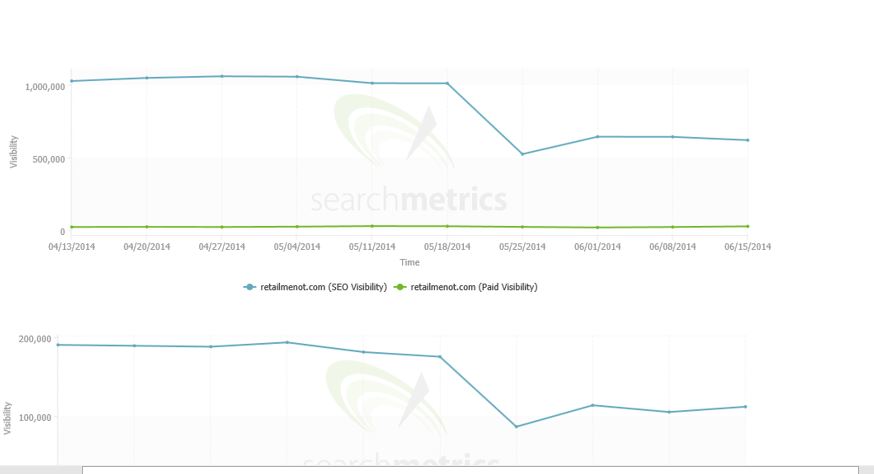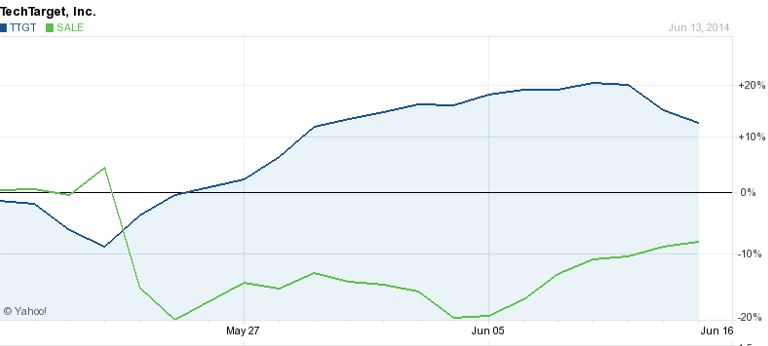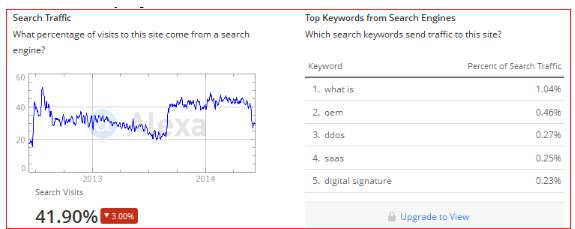TechTarget (NASDAQ:TTGT) has peered into the gaping jaws of death.
And those jaws belong to … a Panda.
Not China’s bamboo-chomping bear. Rather, it was Google Inc (NASDAQ:Google's) Panda update designed to snuff out low quality content from Google’s top search results pages.
Many companies have suffered crushing declines in Google impressions caused by last month’s Panda update – and corresponding losses in stock value.
Now, TheStreetSweeper has found an overlooked Panda victim -- TTGT.
Shares of the Newton, Mass. company -- which is focused on drawing traffic to generate IT leads -- hit this year’s high of $8.46 on June 10.
However, the market was unaware that weeks earlier the company lost more than 33 percent in search visibility, according to a list of losers and winners.
With TTGT’s significant decline in SEO visibility, which happened around the same time of a 5-million-share secondary offering, we think the market has missed a crucial factor.
We believe the stock faces much more significant consequences than the 28 percent stock value slashing endured by a peer company caught by Panda.
In a statement released to TheStreetSweeper, TTGT said organic traffic remains ahead of last year.
“Our experience with the recent Google algorithm changes is consistent with what we’ve seen on previous algorithm changes over the almost 15 years that we have been in business. We operate over 100 websites, and in the immediate aftermath of a algorithm change we see some sites traffic increase and others decline.”
“On a broader point – our experience is that there is an enormous amount of fluctuation after a major Google algorithm change.”
TTGT went on to say that the company has adapted to the changes and established a successful track record in terms of how the changes play out.
If so, we’re not sure why insiders have been selling. Regardless, investors may find various viewpoints on TTGT here.
WHAT HAPPENED TO IMPRESSIONS?
Jealously guarding its top search market share, Google began using code-named Panda in 2011 to filter out poor content so that higher quality content would rise in search rankings.
Google’s leader of the Webspam team, Matt Cutts, tweeted the launch of the Panda update on May 20. Within days, many websites watched as the dreaded drop in organic rankings turned into reality.
Digital coupon marketer Retailmenot (NASDAQ:SALE) fell victim to Panda’s 4.0 wallop, according to Searchmetrics. SALE suffered a huge loss in its Google impressions and, within days, a record decline in stock.
SALE plummeted over $8 – 28 percent – in just a few days. About three weeks later, SALE still has not been able to climb back to its old highflying $30 level.
Check out the visibility loss of both TTGT and SALE, provided by the Searchmetrics Winners and Losers analysis.
TTGT shows a greater than 33 percent decline in SEO (search engine optimization) visibility (not visits), the exact percentage drop suffered by SALE.
“TechTarget just went overboard in pandering to Google,” explained an analyst who requested anonymity.
Compared with six weeks before Panda, SEO visibility (not visitors) dropped to about 86,000 from about 190,000.
This drop is no small thing for TTGT.
According to the May 25 prospectus that is part of its shelf registration of 5 million shares, TTGT considers search engine ranking a key competitive advantage:
“Favorable Search Engine Rankings, Organic search-driven website traffic was up 35% in the first quarter … This is a testament to the power of our targeted content model, which is the foundation of our data business.”
So Panda took a swipe at the company’s very foundation just as TTGT climbed to an EPS of zero from a 4 cent loss the quarter before.
Though other factors may have had some influence, it appears that Panda has accomplished its mission to uproot less impressive sites in its quest to improve visitors’ experiences.
Looking at the SALE and TTGT charts, it’s easy to see the spectacular drop in SEO visibility for both companies in mid-May.
But something else jumps out when we compare TTGT and SALE stock price charts. Though they experienced the same visibility decline, their stock prices are completely out of sync. So the market recognized SALE’s issues. But it has not recognized the very same issues with TTGT, below:
Search traffic clearly suffered too, under Panda. Note the similar declines in search traffic in the charts below for TTGT and SALE, respectively.
That’s not all. Panda’s not-so-gentle paw also clapped down hard on the $62-billion mammoth eBay (NASDAQ:EBAY).
EBay’s experience with Panda prompted comments like this one from Business2Community:
“The decline in ranking has hurt eBay badly. However, since it contains hundreds (of) thousands of pages, it is quite hard to tell what the future holds for the Internet consumer-to-consumer corporation. Nevertheless, its popularity is bound to see decline for a limited duration, during which eBay’s traffic and sales would be affected significantly.”
EBay hasn’t released a statement on the visibility report, possibly because about the same time eBay asked customers to change their passwords due to a cyber attack.
While there may be other factors at work, relevant charts appear to reveal what eBay didn’t. EBay’s chart shows the major hit in SEO visibility and a stock decline that the company – obviously a far healthier company than TTGT - has not been able to shake.
MAY 2013 PANDA CHEWS UP DEMAND MEDIA
Panda really began making its presence known last year, when the third major rewrite offered webmasters a hand-wringing glimpse into the possible effects of algorithm updates. That rewrite smacked many, including eHow.com, the star property of Demand Media(NYSE:DMD). The company depends on Google for more than half of its traffic, the 10-Q states.
DMD’s recent quarterly securities filing discloses the search engine algorithm changes may cause “fluctuations in the total number of Google search referrals to our owned and operated and network of customer websites. In 2011 and 2013, the overall impact of these changes on our owned and operated websites was negative primarily due to a decline in traffic to eHow.com, our largest website.”
DMD’s recent Securities and Exchange Commission document continues:
“These changes have resulted, and may continue to result, in substantial declines in traffic to our owned and operated websites.”
The chart shows that the Panda hit marked the beginning of a stock value slide that persists to the current day. Unique visitors declined to over 80 million from 125 million, while revenues declined to $89.8 million from $101.1 million as operating losses rose.
TTGT is definitely insignificant compared with substantial companies like EBay, DMD and even SALE. But if Panda knocked the lights out of these companies, it’s hard to imagine what it will do to scrawny TTGT and its investors.
LIFE OR DEATH ISSUES GO BACK TO 2011
Companies seem to live and die on that old adage: the better the Google impressions, the more traffic and the more revenue.
Only three years ago, DMD shares traded for an overly optimistic $26. The astonishing stock slide to the current price of under $5 can be connected to those regular, sometimes monthly, updates of the deceptively passive sounding Panda.
People were eating up DMD how-to website, eHow, in December 2010 with questions like, “How to brew beer,” or “How to fix a toilet,” or “How to groom a dog.” But no one posed what might well be one of the most important questions to DMD’s existence, “How to avoid Panda.”
Google was already aiming at spam-riddled, thin, aggregated content with weapons code-named Panda, Penguin and Hummingbird.
Just three months after DMD ventured out with its IPO at $17 in January 2011, a rewritten, soft-eyed Panda lay waiting at its doorstep. Teeth bared.
When Panda bit that April, DMD shares plummeted after an SEO software firm published a report saying eHow had suffered a 66 percent decline in visibility on Google since that Panda update.
DMD, much like SALE, issued a statement poo-pooing the report, stating the company had seen an impact but the decline was “significantly overstated.” The company followed up with a quarterly report showing an estimated 20 percent decline in search referrals. However, the next quarter’s report showed that was not quite right. Revenue had not grown from its $79.5 million level and the report concluded that Panda caused “a substantial reduction in the total number of search referrals.”
There’s been no statement from TTGT, of course, since Panda’s impact on the company has been unknown – until now.
Word is that Google will continue providing Panda updates.
CONCLUSION
TTGT has gained investors’ good graces by reporting improved guidance, a new product and a better-than-expected $23 million quarterly revenue, plus a paltry $135,000 in net income after a loss. Generally, it’s flying under the radar.
Market blindness toward TTGT’s issues - combined with the release of a positive earnings report the same day a public offering was kicked off - created an atmosphere that allowed the smooth sale of millions of TTGT shares.
TTGT director Jay Hoag and others indirectly sold 2.8 million shares for $17 million, as part of the May public offering of 5 million shares – offered at a slight discount by Polaris Venture entities and by entities of Technology Crossover Venture, managed by Mr. Hoag. Selling shareholders, not TTGT, received the proceeds.
Those shareholders joined other insiders who may have been tipping their hand as they’ve sold multi-millions worth of TTGT in just the last six months. In fact, insiders have sold and sold over the years, pocketing upwards of $63 million.
Indeed, TTGT is largely ignored by analysts, sports a ridiculously generous $6 price target and reports yearly revenue declines that have deepened since 2011. The operating income of this company with the stunning $265 million market cap has consistently dropped to the point of losing $2.5 million in 2013.
Now, TTGT must try to overcome that seemingly gentle, doe-eyed virtual monster that has chomped away at both search traffic and SEO visibility so vital to its business of delivering customers.
The market has punished SALE, EBAY and DMD over their crushing Panda experience.
Google’s Panda has TTGT locked in its virtual fangs. Now the market knows and we think the end result will be ugly.
* Important Disclosure: The owners of TheStreetSweeper hold a short position in TTGT and stand to profit on any future declines in the stock price.
Editor's Note: As a matter of policy, TheStreetSweeper prohibits members of its editorial team from taking financial positions in the companies that they cover.



